Located at a crossroads between influential European powers such as Poland, Hungary, the Ottomans or the Mongols, the Principality of Moldova often struggled to maintain its independence, often changing allegiances when the situation demanded it. Supporting a population numbering nearly half a million people, Moldova had a relatively prosperous agricultural economy, being an important supplier of grain and cattle, particularly the latter. Also important to the state revenue were the trade routes, particularly those linking the Black Sea ports of Chilia and Cetatea Alba in the South (and with them access to Genoese and other trade networks) with Poland to the north (and further north to the economies on the Baltic).Urbanization was not particularly wide-spread, with most towns being rather small, but also heavily fortified after decades of withstanding the occasional Mongol raid.
The state was founded by the Kingdom of Hungary as a defensive border province as part of their ongoing efforts against the Golden Horde, with the rulers being Romanian noblemen from east of the Carpathians appointed by the Hungarian King. Eventually, another Romanian nobleman by the name of Bogdan fled Hungarian lands into Moldova where he successfully led a revolt, installing himself as Voievod. Subsequent attempts by the Hungarians to outright conquer the rebels proved fruitless, and Bogdan’s dynasty, the House of Muşat, continued to rule an independent Moldova.
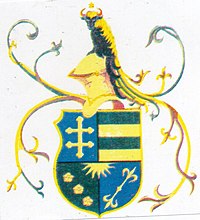
On January 1st 1432, Alexander I “the Good”, a direct descendent of Bogdan I “the Founder”, died, and with him died the peace his long reign had brought to the country. No sooner was his body cold that his relatives started fighting one another in an on-again-off-again civil war that would last for more than 25 years. The year after Alexander’s death, Bogdan, a son of Alexander’s brother (also called Bogdan) had a son whom he called Stephen. By the time he was 16, Stephen had become heir to the Moldavian throne. Little more than two years later, in 1451, he accompanied his father to the wedding of one of his boyars. Unfortunately for them, they were walking into a trap, as said boyar was part of a conspiracy headed by Petru Aaron, Bogdan’s step-brother. Stephen barely managed to escape with his life, while his father was captured by his uncle and beheaded on the spot. After only a couple of years of peace, the flames of civil were lit again, as Petru Aaron was challenged to the throne by Alexandrel, one of Alexander the Good’s nephews. As the two fought it out for almost four years, Stephen took refuge in Transylvania, seeking the protection of Hungary’s ruler, John Hunyadi. There, he furthered his education in the arts of governing and war. After John’s death in 1456, he moved to the court of his first cousin Vlad III Dracula, where he planned his next move.
In 1457, two years after Petru Aaron finally managed to defeat Alexandrel, Stephen, riding at the head of 6,000 horsemen provided to him by Vlad Dracula, entered Moldova gaining wide boyar support after promising to regain the important cities of Chilia and Cetatea Alba on the Black Sea coast. After two battles, at Doljești and Orbic, Aaron flees to his overlord in Poland, while Stephen is crowned Voievod.
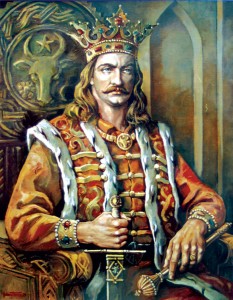
Beside consolidating his rule, renewing trade links with Transylvanian merchants and removing any boyars still loyal to Petru Aaron (of which many feld, but subsequently returned as the years passed), Stephen also led an expedition into Poland that year in search of the man who had killed his father.
For two years, Stephen besieged the castle of Khotin, eventually taking it in 1459, along with the surrounding area, which had all been Moldavian prior to the civil wars brought about by Alexander’s death. However, he couldn’t hope to engage Poland in a protracted fight and conceded to signing a treaty recognizing King Casimir the IV Jagiellon as his suzerain whilst retaining the lands won.
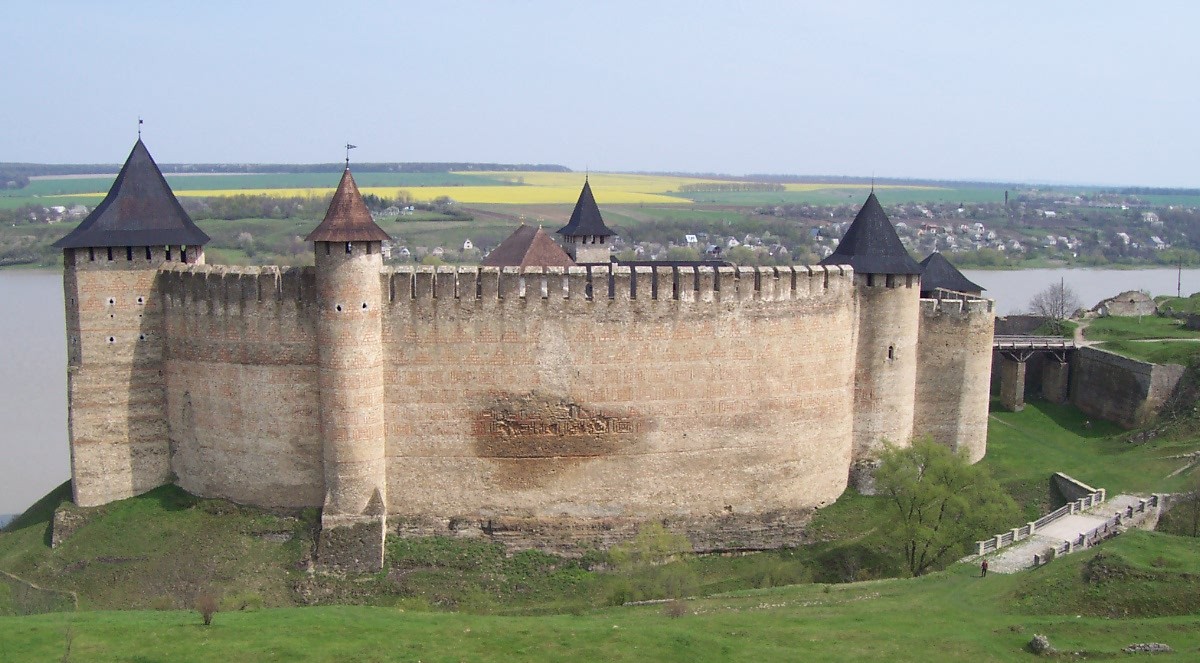
Khotin Castle
As part of the treaty, Aaron was banned from entering Moldavia and lost all Polish support. As a result, he fled to Transylvania, in the Székely Land bordering Moldova, where he came under the protection of Matthias Corvinus, King of Hungary through his representative, the Voievod of Transylvania Sebastian de Rozgony. On June 5th 1461, Stephen led his first incursion into Hungary, but soon backed out when he realized the potential consequences of his action.
During the civil wars, Budjak, the contested region on the Black Sea coast, had reverted to Wallachian control, with Chillia being co-ruled by Hungary and Wallachia. Unable to do anything while things were calm and his hands were tied in his Polish campaign, Stephen bid his time, consolidating his grip on power and undertaking a massive reform of the army, by extending the right to bear arms to ordinary farmers and villagers, even going to far as to introduce the death penalty to anyone who was conscripted and failed to show up armed with at least a sword or spear. Vlad Dracula meanwhile became ever deeper involved in a confrontation with the Ottomans as he refused to pay the Jiza or send young boys to be trained as janissaries. Then, in late 1461, conflict finally erupted between Wallachia and the Ottomans.
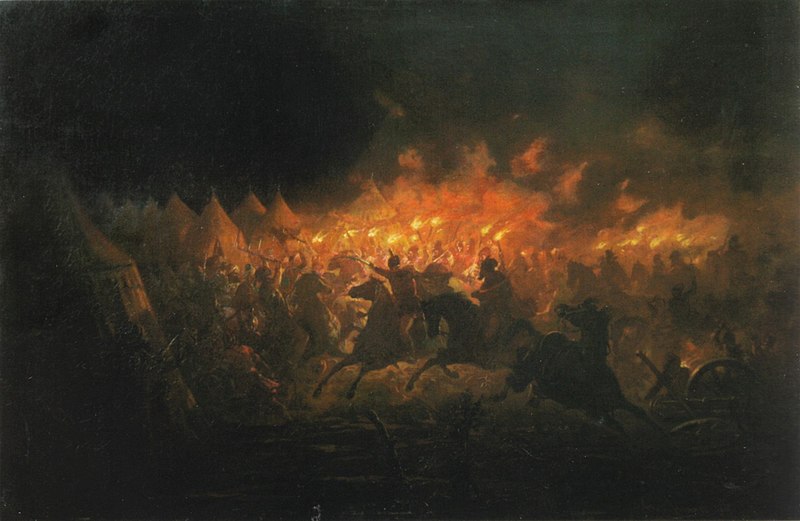
With Dracula at war with Mehmet II, Stephen wrote a letter to his cousin, demanding he hand over the two cities. After receiving his refusal, Stephen allied with the Turks and together they attacked the castle of Chillia on June 22nd, while Vlad was busy battling the Ottomans. Unfortunately for him, the Hungarian garrison and their Wallachian reinforcements of 7000 men held their ground for eight straight days, after which Stephen was forced to retreat. It was during this battle that he nearly got his leg blown off by shrapnel, but managed to escape relatively unscathed (1).
Three years later, in 1465, with Dracula imprisoned by Matthias Corvinus and Wallachia firmly under the Ottoman boot (with Vald’s brother Radu the Handsome installed as Voievod), Stephen again advanced towards Chilia with a large force, mainly Poles, and siege weapons; but instead of besieging the fortress, he showed the garrison, who favoured the Polish King, a letter in which his suzerain required them to surrender the fortress. The garrison complied with the King's demand and Stephen entered the fortress escorted by Polish troops. Mehmed, upon hearing the news, demanded that Chillia be returned to his Wallachian vassals, but backed off from war, for which he was not yet ready when Stephen, in a show of force, raised a large army (mainly Moldavian peasants).



The fortress of Cetatea Alba on the Black Sea
To celebrate his victory, Stephen commenced construction of the monastery of Putna. An impressive sight even to most boyars let alone peasants, the monastery served as a demonstration of both his power and piety, solidifying his grip on power. After each successful campaign, Stephen would go on to build a monastery in northern Moldova to celebrate his victory.
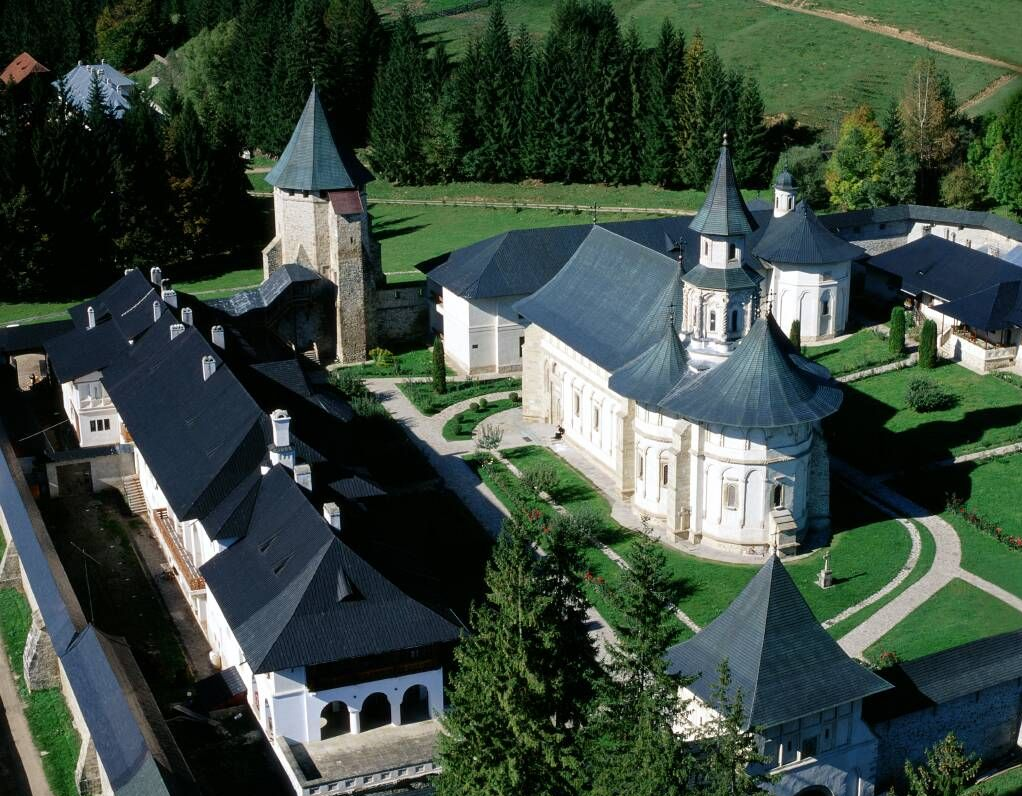
While it did not end up provoking a war with Hungary, the attack on Chillia and Cetatea Alba seriously strained relations between Moldova and Hungary, with the King of Hungary increasing his support of the exiled Petru Aaron. The reaction came swiftly, as Stephen, now benefiting greatly from his direct control of the trade routes, used his newly-earned money to foment a minor uprising in Transylvania, with the intent of killing Petru Aaron. The operation backfired though, as Matthias Corvinus managed to quash the uprising and then proceeded to assemble a large army of 40,000 men, along with 500 cannons, with the intent of either directly annexing Moldova or at least installing Petru Aaron back on the throne.
Starting in October 1467, the Hungarians invaded Moldova and proceeded to burn down several important towns without meeting any organized resistance. During early December, Stephen sent envoys to negotiate a peace treaty, but the two factions could not agree and the war continued, with the Hungarians reaching the town of Baia. There, Corvinus met with a Hungarian by the name of Sythotus, who revealed to him the Moldavian position, their numbers (2) and their plan to attack before dusk. Upon hearing this, he proceeded to fortify the city with ramparts, ditches and a ring of wagons and had his men stay alert.
On December 15th, as dusk was approaching, Stephen sent smaller detachments that set the town on fire from three different places: thereafter, noise and confusion set in the Hungarian ranks. Stephen ordered his men to dismount and soon after they launched their attack and made battle at the gates and then in the burning streets until dawn. As the Moldavians got the upper hand of the battle, they engaged the royal guard, which consisted of 200 heavily armed knights, the aristocrats and Corvinus. Many Moldavians were killed in the tumult that followed, as the knights tried to defend the entrance to the market. Attacked from multiple angles and with little cohesion left, the Hungarian army was rapidly disintegrating. Corvinus himself was hit the back by three arrows and was carried from the battlefield on a stretcher. Thereafter, the Hungarians attempted to retread. Unfortunately for them, Steven had decided to personally lead the cavalry attack on the enemy rear once he saw the Hungarian lines collapsing (3). Caught in the open, with cavalry charging at them from both sides and with their King wounded, the men of the royal guard surrendered, followed by the rest of the army shortly afterwards.

Depiction of the battle
The result for the Kingdom of Hungary was devastating – the cream of their fighting force was killed or captured, along with many influential barons and most importantly, their king. What’s more, Stephen immediately began crossing the Carpathians back into Transylvania. There, he extracted large sums of gold from the local communities which he used to further enlarge his forces by hiring numerous mercenaries. Seeing the situation hopeless, Matthias Corvinus acceded to Stephen’s demands: a huge sum of money paid for his release, the region of Maramures (from where Stephen’s dynasty originally hailed) to be directly annexed to Moldova, large estates in Transylvania to be given to Stephen as well as granting him the title of Voievod of Transylvania (replacing Sebastian de Rozgony), thus effectively making Stephen the second most important man in the Kingdom of Hungary.
Once all of this had been done, Corvinus realized that his days as King of Hungary were numbered unless he did one of two things – either confiscate a good part of the wealth of his barons, execute or exile anyone who opposed him and defeat the rebellion that would surely follow or attack Stephen, decisively defeat him and thus undo all the damage he had caused. Unwilling to burn his own country down just to save his skin, Corvinus opted for the latter.
Thus, for most of 1468, Hungarian forces battled Moldavian mercenaries across Transylvania in numerous minor engagements, sieges and skirmishes. Eventually a tipping point was reached when Stephen finally tracked down and caught Petru Aaron, personally beheading him on the spot as the usurper himself had done to Stephen’s father. This caused even the last opposition among the Moldavian nobility to rally to Stephen’s cause. Shortly afterwards, most of the German cities throughout Transylvania, sensing which way the wind was blowing, switched over to Stephen’s side, followed shortly afterwards by a majority of the Szekely nobility. Without even meeting his rival again in battle, Matthias Corvinus died childless, poisoned by his own nobles.
1 – This is the POD. OTL, Stephen was wounded by said shrapnel
2 -Stephen had 12,000 men under his command
3 – given that he has no injury preventing him to do so TTL
The state was founded by the Kingdom of Hungary as a defensive border province as part of their ongoing efforts against the Golden Horde, with the rulers being Romanian noblemen from east of the Carpathians appointed by the Hungarian King. Eventually, another Romanian nobleman by the name of Bogdan fled Hungarian lands into Moldova where he successfully led a revolt, installing himself as Voievod. Subsequent attempts by the Hungarians to outright conquer the rebels proved fruitless, and Bogdan’s dynasty, the House of Muşat, continued to rule an independent Moldova.

Coat of arms of the House of Muşat
On January 1st 1432, Alexander I “the Good”, a direct descendent of Bogdan I “the Founder”, died, and with him died the peace his long reign had brought to the country. No sooner was his body cold that his relatives started fighting one another in an on-again-off-again civil war that would last for more than 25 years. The year after Alexander’s death, Bogdan, a son of Alexander’s brother (also called Bogdan) had a son whom he called Stephen. By the time he was 16, Stephen had become heir to the Moldavian throne. Little more than two years later, in 1451, he accompanied his father to the wedding of one of his boyars. Unfortunately for them, they were walking into a trap, as said boyar was part of a conspiracy headed by Petru Aaron, Bogdan’s step-brother. Stephen barely managed to escape with his life, while his father was captured by his uncle and beheaded on the spot. After only a couple of years of peace, the flames of civil were lit again, as Petru Aaron was challenged to the throne by Alexandrel, one of Alexander the Good’s nephews. As the two fought it out for almost four years, Stephen took refuge in Transylvania, seeking the protection of Hungary’s ruler, John Hunyadi. There, he furthered his education in the arts of governing and war. After John’s death in 1456, he moved to the court of his first cousin Vlad III Dracula, where he planned his next move.
In 1457, two years after Petru Aaron finally managed to defeat Alexandrel, Stephen, riding at the head of 6,000 horsemen provided to him by Vlad Dracula, entered Moldova gaining wide boyar support after promising to regain the important cities of Chilia and Cetatea Alba on the Black Sea coast. After two battles, at Doljești and Orbic, Aaron flees to his overlord in Poland, while Stephen is crowned Voievod.

Beside consolidating his rule, renewing trade links with Transylvanian merchants and removing any boyars still loyal to Petru Aaron (of which many feld, but subsequently returned as the years passed), Stephen also led an expedition into Poland that year in search of the man who had killed his father.
For two years, Stephen besieged the castle of Khotin, eventually taking it in 1459, along with the surrounding area, which had all been Moldavian prior to the civil wars brought about by Alexander’s death. However, he couldn’t hope to engage Poland in a protracted fight and conceded to signing a treaty recognizing King Casimir the IV Jagiellon as his suzerain whilst retaining the lands won.

Khotin Castle
As part of the treaty, Aaron was banned from entering Moldavia and lost all Polish support. As a result, he fled to Transylvania, in the Székely Land bordering Moldova, where he came under the protection of Matthias Corvinus, King of Hungary through his representative, the Voievod of Transylvania Sebastian de Rozgony. On June 5th 1461, Stephen led his first incursion into Hungary, but soon backed out when he realized the potential consequences of his action.
During the civil wars, Budjak, the contested region on the Black Sea coast, had reverted to Wallachian control, with Chillia being co-ruled by Hungary and Wallachia. Unable to do anything while things were calm and his hands were tied in his Polish campaign, Stephen bid his time, consolidating his grip on power and undertaking a massive reform of the army, by extending the right to bear arms to ordinary farmers and villagers, even going to far as to introduce the death penalty to anyone who was conscripted and failed to show up armed with at least a sword or spear. Vlad Dracula meanwhile became ever deeper involved in a confrontation with the Ottomans as he refused to pay the Jiza or send young boys to be trained as janissaries. Then, in late 1461, conflict finally erupted between Wallachia and the Ottomans.

Wallachian soldiers attacking a Turkish camp at night
With Dracula at war with Mehmet II, Stephen wrote a letter to his cousin, demanding he hand over the two cities. After receiving his refusal, Stephen allied with the Turks and together they attacked the castle of Chillia on June 22nd, while Vlad was busy battling the Ottomans. Unfortunately for him, the Hungarian garrison and their Wallachian reinforcements of 7000 men held their ground for eight straight days, after which Stephen was forced to retreat. It was during this battle that he nearly got his leg blown off by shrapnel, but managed to escape relatively unscathed (1).
Three years later, in 1465, with Dracula imprisoned by Matthias Corvinus and Wallachia firmly under the Ottoman boot (with Vald’s brother Radu the Handsome installed as Voievod), Stephen again advanced towards Chilia with a large force, mainly Poles, and siege weapons; but instead of besieging the fortress, he showed the garrison, who favoured the Polish King, a letter in which his suzerain required them to surrender the fortress. The garrison complied with the King's demand and Stephen entered the fortress escorted by Polish troops. Mehmed, upon hearing the news, demanded that Chillia be returned to his Wallachian vassals, but backed off from war, for which he was not yet ready when Stephen, in a show of force, raised a large army (mainly Moldavian peasants).

The fortress of Cetatea Alba on the Black Sea
Putna Monastery
While it did not end up provoking a war with Hungary, the attack on Chillia and Cetatea Alba seriously strained relations between Moldova and Hungary, with the King of Hungary increasing his support of the exiled Petru Aaron. The reaction came swiftly, as Stephen, now benefiting greatly from his direct control of the trade routes, used his newly-earned money to foment a minor uprising in Transylvania, with the intent of killing Petru Aaron. The operation backfired though, as Matthias Corvinus managed to quash the uprising and then proceeded to assemble a large army of 40,000 men, along with 500 cannons, with the intent of either directly annexing Moldova or at least installing Petru Aaron back on the throne.
Starting in October 1467, the Hungarians invaded Moldova and proceeded to burn down several important towns without meeting any organized resistance. During early December, Stephen sent envoys to negotiate a peace treaty, but the two factions could not agree and the war continued, with the Hungarians reaching the town of Baia. There, Corvinus met with a Hungarian by the name of Sythotus, who revealed to him the Moldavian position, their numbers (2) and their plan to attack before dusk. Upon hearing this, he proceeded to fortify the city with ramparts, ditches and a ring of wagons and had his men stay alert.
On December 15th, as dusk was approaching, Stephen sent smaller detachments that set the town on fire from three different places: thereafter, noise and confusion set in the Hungarian ranks. Stephen ordered his men to dismount and soon after they launched their attack and made battle at the gates and then in the burning streets until dawn. As the Moldavians got the upper hand of the battle, they engaged the royal guard, which consisted of 200 heavily armed knights, the aristocrats and Corvinus. Many Moldavians were killed in the tumult that followed, as the knights tried to defend the entrance to the market. Attacked from multiple angles and with little cohesion left, the Hungarian army was rapidly disintegrating. Corvinus himself was hit the back by three arrows and was carried from the battlefield on a stretcher. Thereafter, the Hungarians attempted to retread. Unfortunately for them, Steven had decided to personally lead the cavalry attack on the enemy rear once he saw the Hungarian lines collapsing (3). Caught in the open, with cavalry charging at them from both sides and with their King wounded, the men of the royal guard surrendered, followed by the rest of the army shortly afterwards.

Depiction of the battle
The result for the Kingdom of Hungary was devastating – the cream of their fighting force was killed or captured, along with many influential barons and most importantly, their king. What’s more, Stephen immediately began crossing the Carpathians back into Transylvania. There, he extracted large sums of gold from the local communities which he used to further enlarge his forces by hiring numerous mercenaries. Seeing the situation hopeless, Matthias Corvinus acceded to Stephen’s demands: a huge sum of money paid for his release, the region of Maramures (from where Stephen’s dynasty originally hailed) to be directly annexed to Moldova, large estates in Transylvania to be given to Stephen as well as granting him the title of Voievod of Transylvania (replacing Sebastian de Rozgony), thus effectively making Stephen the second most important man in the Kingdom of Hungary.
Once all of this had been done, Corvinus realized that his days as King of Hungary were numbered unless he did one of two things – either confiscate a good part of the wealth of his barons, execute or exile anyone who opposed him and defeat the rebellion that would surely follow or attack Stephen, decisively defeat him and thus undo all the damage he had caused. Unwilling to burn his own country down just to save his skin, Corvinus opted for the latter.
Thus, for most of 1468, Hungarian forces battled Moldavian mercenaries across Transylvania in numerous minor engagements, sieges and skirmishes. Eventually a tipping point was reached when Stephen finally tracked down and caught Petru Aaron, personally beheading him on the spot as the usurper himself had done to Stephen’s father. This caused even the last opposition among the Moldavian nobility to rally to Stephen’s cause. Shortly afterwards, most of the German cities throughout Transylvania, sensing which way the wind was blowing, switched over to Stephen’s side, followed shortly afterwards by a majority of the Szekely nobility. Without even meeting his rival again in battle, Matthias Corvinus died childless, poisoned by his own nobles.
1 – This is the POD. OTL, Stephen was wounded by said shrapnel
2 -Stephen had 12,000 men under his command
3 – given that he has no injury preventing him to do so TTL


